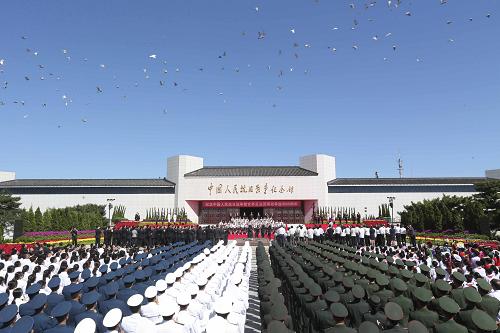China contributes greatly in World Anti-Facist War
 0 Comment(s)
0 Comment(s) Print
Print E-mail Xinhua, September 2, 2014
E-mail Xinhua, September 2, 2014
|
|
|
A commemoration marking the 69th anniversary of the victory of the Chinese people's war of resistance against Japanese aggression is held at the Museum of the War of Chinese People's Resistance Against Japanese Aggression in Beijing, capital of China, Sept. 3, 2014. [Xinhua/Wang Ye] |
How can we commemorate the victory of anti-fascist war without marking the role played by China?
China's 14-year anti-Japanese war was an important part of the World Anti-fascist War.
China was the world's first nation to fight against fascist forces. As early as Sept. 18, 1931 when Japanese troops began invasion of northeast China, Chinese people had started their endeavor, which was intensified when Japan's full-scale invasion began after the July 7 Incident in 1937.
The fact that China engaged the bulk of the Japanese ground troops from 1937 to the end of World War II alone could earn China the title of one of the major forces in World Anti-Fascist.
Chinese archives revealed that in the eight years from 1937, allied forces killed and wounded about 1.95 million Japanese soldiers. About 70 percent of these casualties took place in battlefields in China.
China's endeavor consisted of frontal battles waged by the kuomintang (KMT) army and rear battles launched by the eighth route army and the new fourth army led by the Communist Party of China (CPC).
Under extremely difficult conditions and with the help of civilians, they crushed better-armed Japanese troops' ambition to take China in three months.
However, the Chinese army's anti-fascist efforts were not confined within the borders of its own land. They also went abroad to support allied countries.
It must be remembered that China was one of the major members in an alliance to oppose the Axis of Germany, Japan and Italy. Other countries included the United States and Britain.
In addition to providing assistance and information to the allied countries, from March 1942 to the end of the WWII, China sent an expedition army to fight Japanese troops and support allied troops in an area that covered China's Yunnan Province, Myanmar and India.
According to official archives, some 400,000 soldiers were mobilized for the expedition, but only half of them survived.
Chinese army efforts lent important support not only to the allied forces in Pacific and also to the people fighting against Japanese troops in Southeast Asian countries.
China was also a major player in promoting the post-WWII order. On 1 Dec. 1943, China, the United States and Britain issued The Cairo Declaration. About two years later, the three nations signed The Potsdam Proclamation which demanded Japan's unconditional surrender to the Allies at the end of World War II.
The two documents made great and far-reaching contributions to stability in post-war East Asia.
With its huge loss of lives and remarkable efforts in and outside its own land, China has left an indelible mark on the World Anti-Fascist War.







Go to Forum >>0 Comment(s)